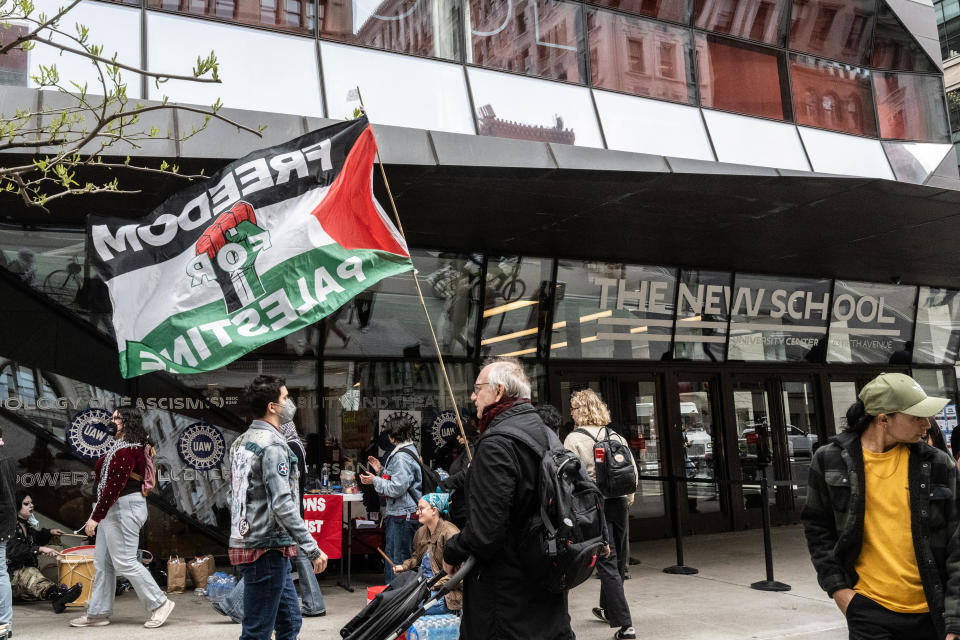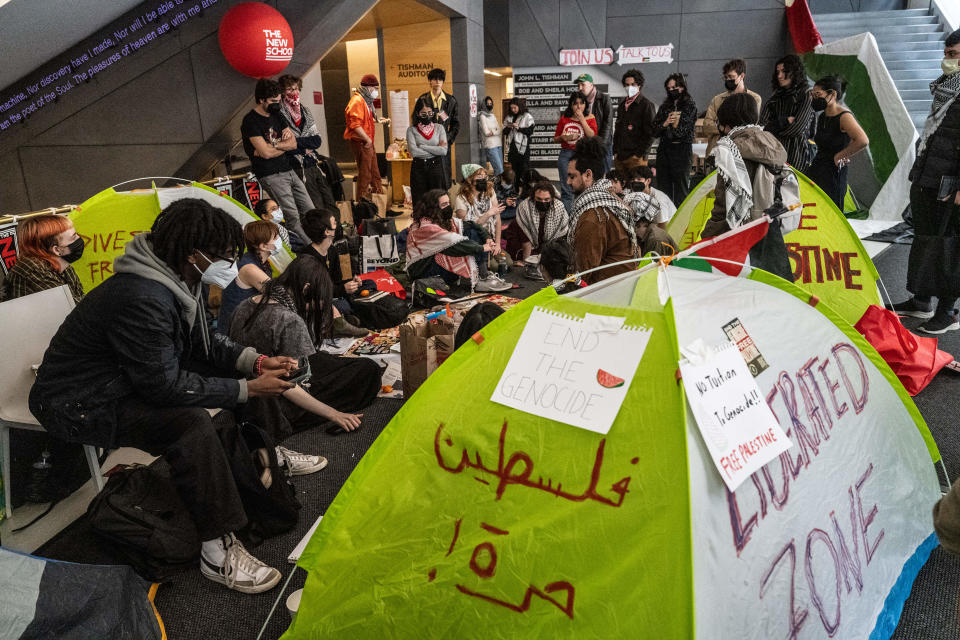Columbia University pro-Palestinian encampments spread to NYU, New School, Yale
NEW YORK — Cops on Monday cleared an encampment at Yale University to protest the war in Gaza and detained dozens of students, as demonstrators at New York University and The New School set up tents after a similar action at Columbia University led to the arrests of more than 100 protesters.
Yale students had set up a camp Friday in Beinecke Plaza, the central area on the school’s New Haven campus. Demonstrators called on university administration to divest from Israel.
Administrators said the students could stay through the weekend but would be evicted Monday. When protesters refused to leave Monday morning, cops moved in.
“With no warning of when they would come, police ambushed us at 6:40 am while students at the encampment were sleeping,” the student-led group Occupy Beinecke posted on Instagram.
“Yale, you have intimidated us, criminalized us, militarized our campus, and failed to accept our demands,” the students continued. “We will not stop, we will not rest until we have disclosure and divestment.”
A spokeswoman for Yale did not immediately return a request for comment.
New Haven police said they arrested an estimated 45 people and released all of them with summonses to appear in court. The protesters were all charged with misdemeanor trespassing.
“No one will stop you from leaving. If you do not leave, you will be arrested. We will give you time to leave. If you do not leave, you will be arrested,” police announced to student protesters, videos show.
As of Monday at 6 a.m., about 50 NYU undergraduate and graduate students occupied Gould Plaza on W. 4th St. outside the Stern School of Business, according to the NYU Palestine Solidarity Coalition of student and faculty groups and university officials. Messages emblazoned on signs and tents included “deoccupy,” “free Palestine” and “Jews for anarchy.”
“Heeding the call from our comrades at Columbia, NYU students have brought the Gaza Solidarity Encampment to our campus,” the coalition said. “We amplify the call for Palestinian liberation and the divestment of our universities from the zionist project.”
Like the Columbia demonstration, students are calling for the university to divest from Israel and reverse all student and faculty discipline measures related to pro-Palestinian activism. Their demands include to end the university’s partnership with Tel Aviv University and to shut down its Tel Aviv campus.
A rep for NYU said the demonstration began without notice to the university.
“We are addressing this issue with urgency,” spokesman John Beckman said in a statement.
“Access to the plaza has been closed,” he continued. “Classes are carrying on. The University is committed to minimizing disruption to its academic mission; preventing escalation and violence; and precluding hate speech, harassment, or threats directed at any member of the NYU community.”
A half mile away, about a dozen students at The New School on Sunday erected a green-white-and-blue encampment inside the university center building, writing on the tents with red marker: “liberated zone,” “free Palestine,” and “divest from death.”
The demonstration comes after the campus chapter of Students for Justice in Palestine was put on probation last Friday through the next school year, prohibiting the student group from hosting public events or using school resources, the group wrote on social media.
“We will remain until ALL our demands are met,” the student group vowed.
The New School, in a message to students on Sunday, said the demonstration was unauthorized but college officials were in communication with protesters to “resolve the situation.”
“Because of the successful dialogue between the President and the students, there will be no charges for the demonstration,” the memo added.
Students protesters on Monday were set to meet with a college operations official to discuss divestment from Israel and eyeing a meeting with the Board of Trustees’ Investment Committee pushing them for greater transparency. The New School said it would also launch an investment advisory committee with elected student representatives.
“During this especially charged time in our society,” the email continued, “the university is strongly committed to supporting the rights of members of our community to peacefully protest and express themselves, and to do so in accordance with the university’s codes of conduct.”
In Boston, administrators at Harvard beat students to the spot and closed Harvard Yard ahead of anticipated pro-Palestine protests, while classes continued as usual.
“Structures, including tents and tables, are not permitted in the Yard without prior permission,” read a sign on a gate, which was photographed by the Harvard Crimson.


